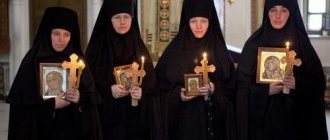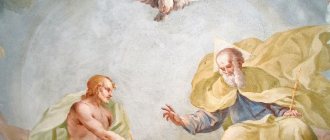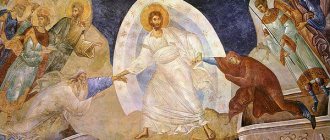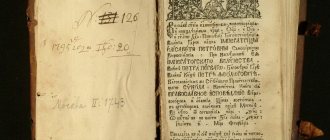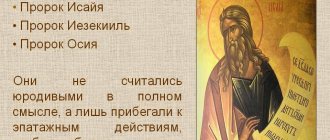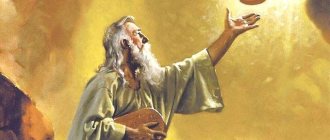Meaning of the word holy
saint (holy church.
,
outdated
), holy, holy; holy, holy, holy.
1.
In religious ideas - possessing absolute perfection and purity, divine (
rel.
). Holy Spirit. Holy Church.
2.
In the same ideas - righteous, immaculate, corresponding to the religious ideal (
rel.
).
Holy man. “In his old age, one gray-haired monk was saved by holy living and prayers.” Pushkin
.
3.
in meaning noun
saint, saint,
husband
, saint, holy,
female
In the Christian cult, a person who spent his life defending the interests of the church and religion and after death was recognized as an indisputable example of Christian life and the patron of believers (
church
).
Cult of saints. Canonization. “He, according to his grandmother, is naked, like a Turkish saint.” Leskov
.
“Uncle Peter was also literate and very well-read from the scriptures; they always argued with grandfather about which of the saints was holier than which.” M. Gorky
.
4.
In the Christian cult -
adj.
, by
value
associated with such a person (
church
).
“Punish, holy saint, Captain Furrow.” Pushkin
.
“Transfer the holy relics and place them in the cathedral.” Pushkin
.
5.
in meaning noun
saints, saints,
units
saint, saint,
husband
Icons with images of such people (
rel. obsolete
).
“Under the saints there is an oak table.” Pushkin
.
“Under the saints in the corner she timidly hid.” Zhukovsky
.
6.
In the Christian cult - endowed with divine grace, who is the source of divine power (
church
). Holy water. Holy gifts (communion).
7.
transfer
Imbued with something high, sublime, ideal (
poetic
,
obsolete
).
“His holy lyre is silent.” Pushkin
.
“Keep the holy purity of innocence and proud modesty.” Pushkin
.
“With eternal love, holy, I remember my native country.” I. Kozlov
.
“Let the holy truth burn as our guiding star.” Pleshcheev
.
“There the holy female soul fades away like a slave.” Nekrasov
.
“Love... Holy excitement!” Goncharov
.
|
Deeply revered, dear, cherished, beloved (
book trade
).
“Oh, holy homeland, what heart does not tremble, blessing you?” Zhukovsky
.
“The more often the lyceum celebrates its saint, simply, as they say, nothing is sacred.” Saltykov-Shchedrin
.
“Ah, uncle, for me there was nothing on earth holier than love.” Goncharov
.
|
True, great, majestic in its tasks, exceptional in importance (
book trade
).
“...Communists, act together with non-party workers, organize a friendly bloc for a common and holy cause, for the election of the highest bodies of your native, Soviet government.” Molotov
.
Defense of the socialist fatherland is the sacred duty of the working people. Holy duty. “He fell a hero... he rushed into the battle - and, falling, he accomplished a great, holy deed.” Pushkin
.
|
Absolutely necessary, very important (
colloquial
).
“Service in friendship is a sacred thing.” Krylov
.
“Agreement is a sacred thing; it incites the lawyer, keeps him cheerful, obliges him to be inventive.” Saltykov-Shchedrin
.
|
Unshakable, unbreakable.
“...It is necessary to observe sacredly (
adv. ) the laws and regulations of the Soviet government...”
Lenin
.
“Tatiana’s letter is in front of me;
I sacredly ( adv. ) take care of him.”
Pushkin
.
“I sacredly (
adv. ) cherish this ring given to me by you.”
Languages
.
“There would be a book’s worth of speeches about this holy truth.” Krylov
.
“What is taken is holy.”
(
last
)
“Why are other people’s opinions only sacred?” Griboyedov
.
•
like God is holy (
colloquial obsolete
) -
transl.
definitely, anyway.
“I’ll sell my property like God is holy and squander it, and I won’t leave you half a dime.” Pushkin
.
Holy Week or Holy ( colloquial obsolete
,
church
) is the Easter holiday among Christians.
Holy simplicity! - see
simplicity.
Holy Russia ( popular poet
,
rhetorician
) is the name of Russia, Russia.
“Holy Rus'! fatherland! I am yours." Pushkin
.
“If the good man wouldn’t travel around holy Rus'.” epic
.
Holy of holies
,
female
(
book rhetorician
) - something especially dear, cherished, inaccessible to the uninitiated.
"it is difficult to penetrate the holy of holies of man." leskov
.
( the original
part of the Jerusalem temple, where only the high priest could enter.) holy father or ruler (
church
) - a respectful address to a minister of worship.
- and he ran away, father abbot? - ran away, holy lord. “This is already the third day.” Pushkin
.
Holy spirit - see
spirit.
At least take the saints (out) ( colloquial
) -
pogov.
about completely indecent, ugly behavior (
cf. saint in 5 meanings
).
“A smart person is either a drunkard, or he’ll make such a face that you can even take away the saints.”
Gogol.
Saints in the form of people
If a saint appears in the form of a living person, the dream indicates the acquisition of higher spirituality. However, a dark creature may also be hiding under his image. Therefore, it is important to take into account all the attributes of sleep: clothes, mood, spoken words.
If a saint behaves strangely and has qualities incompatible with his rank, the vision is a warning that the person has fallen under the influence of dark forces.
History and value of the Last Supper icon
The creation in the form of a fresco by Leonardo da Vinci and the icon in question are intertwined. That is why many icon painters and great masters of painting have been interested in the question from time immemorial: “How exactly are these works related to each other?” However, it is truly known that the picturesque fresco of the great creator and the sacred image of that main event for Christians carry different goals, despite the fact that they are deeply symbolic and play a certain role for history and each person individually.
The Last Supper has a broad meaning, since it symbolizes a certain beginning of a new life path for all humanity and at the same time is a vivid symbol of a new stage in the relationship between the Almighty and the people as a whole. Based on such knowledge, it can be argued that due to this meaning, this icon is located in every Orthodox Christian church above the entrance to the altar. This is also why only bread and wine are sacrificed, since blood has not been shed since time immemorial, because it was at one time redeemed by Jesus Christ. Dear Friends, we remind you that on our pages it is easy to buy the icon of the Last Supper and other icons of Jesus Christ inexpensively!
Acts of Holy Thursday: 1. Washing the feet is a kind of ritual; 2. Eucharist; 3. Prayer services; 4. Betrayal of the disciple and follower, that is, Judas; 5. Taking into custody.
The general significance of the icon is familiar to every Christian and in order to talk about its meaning, you do not need to make any effort, but it will take years to understand and comprehend. This is due to the fact that the general awareness of the deep meaning of the meal, which is reflected in the icon, comes to each person in due time.
Almost every person, and especially a Christian, knows that throughout the year a certain sacrament is performed in a church or temple, which was previously established by the Almighty. It was at that moment, on the eve of Easter night, at the Last Supper, that a significant event occurred, which is reflected in this shrine. It is important to note that 2000 years ago, Passover was celebrated in honor of the liberation of the then Jews from Egyptian slavery. In those days, Jesus Christ washed the disciples’ feet with his own hands and shared the evening meal with them. He broke the bread and distributed it to the apostles, and after the bread they passed the cup. It is these events that are depicted in the well-known icon, as well as in the fresco of the painter of the High Renaissance.
Appearance
If mental resources are occupied with resolving issues between the realization of the ego and the limitations of morality, then the latter can be reinforced by images of saints. Why do you dream of a spiritual authority who turns into a demon before your eyes or shows emotions atypical for his position? It is these details that make you think about the correctness of actions in relation to the object of interest at the moment.
A saint in the form of a commoner is an unfavorable dream. You should pay special attention to your surroundings, as trusted people may turn out to be traitors. It is better to relegate commercial and business projects to the background.
Why do you dream of Saint Matrona, dressed in rags? The beggarly image of the protector foreshadows enrichment. The period is favorable for building a house and starting relationships.
Holiness
See section SAINTS and HOLINESS
- Holiness A brief dictionary of hagiographic terms
- Saint. Holiness Theological-Liturgical Dictionary
- On the holiness and spirituality of Metropolitan. Sourozhsky Anthony
- Holiness of God * Holiness of the Church Priest Oleg Davydenkov
- Holiness as the result of priestly asceticism. Sergiy Dergalev
- What is holiness and why should an Orthodox Christian read “The Lives of the Saints” by St. Justin (Popovich)
- The holiness of man in the Orthodox ascetic tradition prof. A.I. Osipov
- Hagiology
Holiness – 1) one of the essential Divine properties; 2) a high degree of spiritual involvement (closeness) to God.
Three levels of holiness can be distinguished: - Holiness belongs to God, only God is holy by His nature. We can only be holy through the participation of God's holiness. “Further, we say that all Christians are called to holiness. The Apostle Paul addresses his epistles to all the saints in Rome, Colossae, etc., he addresses the Christian communities. Likewise, the Apostle Peter writes about Christians as a “holy people.” In this sense, all Christians are holy. — Finally, we are talking about those saints who are glorified by the Church.
“By calling God holy, we confess that He is completely pure from all sin, cannot even sin, and in all His actions is completely faithful to the moral law, and therefore hates evil and loves only goodness in all His creations.” (Metropolitan Macarius. Orthodox Dogmatic Theology)
“God is not involved in any evil” (Message of the Patriarchs of the Eastern Catholic Church on the Orthodox Faith, part 3).
A person is called a saint because of his participation in the All-Holy God, by virtue of union with Him, participation in His all-perfect Life.
Holiness is the unity of man with the Spirit of the Lord (1 Cor. 6:17), the indwelling of the grace of the Holy Spirit in man. Holiness is a gift of God acquired by a person through the action of Divine grace. But to receive this gift a person must make an effort. These efforts consist of fighting one’s sinful passions. During this struggle, the Christian ascetic receives the grace of the Holy Spirit, which transforms his nature damaged by sin. Holiness is the transformation, the deification of fallen human nature through the action of the Divine grace of the Holy Spirit.
The holiness of Christians does not lie in sinlessness, but in a persistent and consistent aversion to sin.
***
Metropolitan Anthony of Sourozh: A saint is a person who has opened himself to God and through whom God seems to act and shine. And I think that many saints did not perform any miracles, but they themselves were miracles.
Icons
Seeing the gaze of a saint from an icon in a dream is a harbinger of a fateful or joyful meeting. Blessing or punishment are also possible interpretations. The dream is one who has taken the path of correction as a sign of approval, and also as an incentive to repentance.
Holy places, blessed water in a dream - to favorable events. Dreams promise recovery for the sick, longevity for the healthy. Dreaming of a holy place symbolizes the need for solitude, calm, and reflection. Such a dream reminds you of what will truly support you in difficult times.
A dream in which ordinary people sprayed holy water in the dreamer's face has a negative meaning: in reality they are hypocrites.
A priest appears in a dream as confirmation of the protection of higher powers, the intercession of the Guardian Angel.
Icons of saints in dreams and interpretations:
- Seraphim of Sarov - a call for an independent decision;
- Holy Mother of God - you need to learn to endure and forgive;
- Spyridon of Trimifuntsky - the housing issue will soon be resolved;
- Nicholas the Wonderworker - protection from unjustified monetary losses;
- Matrona of Moscow - joy and harmony in the family;
- Peter the Apostle - receiving revelation, finding a spiritual teacher;
- St. George the Victorious - the presence of protection from sorrows and misfortunes;
- Saint Olga - an indication of the need for a prayer service in honor of the dead; receive her patronage;
- Panteleimon - to healing from diseases;
- Saint Matrona - to establish love relationships; for unmarried girls - to meet their betrothed; for men - to easily overcome difficulties.
If you dreamed that you were kissing the icon of the Mother of God, an heir would be born into the family.
What is holiness?
Orthodoxy considers holiness as the highest level of human spiritual development. But this category also includes two previous stages: the initial one, which can conventionally be called salvation, and the second - righteousness. Therefore, before talking about holiness, it is necessary to talk about the two previous steps.
The first, lowest, is clearly depicted in the Gospel, when Christ says to the thief crucified to His right: today you will be with Me in Paradise (Luke 23:43). How to understand these words of Christ? After all, the robber not only did nothing righteous, but, on the contrary, he, figuratively speaking, had blood on his hands up to his elbows?!
However, if we look at the Gospel context, we encounter the same amazing phenomenon more than once. Thus, Christ sets the example of the Pharisees as a publican, a tax collector, who deceives his fellow men left and right. Who are the Pharisees? Based on the vows taken, they can be compared, so that it is understandable for a modern person, with monasticism - both of them set the goal of their lives to carefully fulfill the entire law of God.
Christ justifies the harlot caught in open sin, and says to the Pharisees: “Truly I say to you, tax collectors and harlots are going ahead of you into the kingdom of God” (Matthew 21:31). For their pride and exaltation over other people, for their hypocrisy, the Savior calls the Pharisees vipers, snakes, whitened tombs, which on the outside seem holy, but on the inside are filled with abomination and theft. What does Christ call abomination and robbery? Seeing yourself as righteous.
This narcissism, which hides from a person his sins, primarily internal ones, such as vanity, envy, deceit, pride, etc., makes a person incapable of accepting Divine purity and holiness. For salvation, it turns out, a person needs something completely different - awareness of his spiritual and moral impurity. Only those who are able to see and realize their abominations and internally reject them, repent, acquire a state of salvation and receive salvation, as we see from the case of the robber. This is the first and most important stage of a person’s spiritual development, leading him to full holiness.
What is the second stage, righteousness? We see people trying to live according to their conscience, striving not to offend or oppress anyone. All these people who sincerely strive to live according to their conscience and fulfill the golden rule of human life: as you want people to do to you, do so to them (Matthew 7:12) and are the righteous.
However, such a life, as long as passions still live in a person, cannot have perfect spiritual purity. Passions certainly distort behavior and force some to love more, others less, to become angry and irritated, to judge, to be stingy, etc. Therefore, righteousness is still far from what is called holiness in the Church.
A saint is only that person who not only does not violate the moral standards of life (that is, lives righteously), but also has acquired what is called purity of heart, which is the fruit of a correct spiritual life. Such a life necessarily presupposes righteousness, but is far from being exhausted by it. Spiritual life consists of fighting one’s passions, constantly paying attention to one’s thoughts, feelings, desires, and moods in order to cleanse the mind and heart from everything evil, nasty, and contrary to the commandments of Christ. This life requires a careful study of the Holy Scriptures and the works of the Holy Fathers, mainly ascetic ones, and is associated with constant prayer (mostly Jesus prayer: “Lord Jesus Christ, have mercy on me”), with fasting and abstinence of all one’s feelings, bodily and mental. Spiritual life also requires special external conditions that those seeking spiritual perfection have always created for themselves: renunciation of family life, property (except for the most necessary), from connections with worldly activities and worldly people - in general, from everything that scatters the mind, interferes with prayer, internal concentration . Since ancient times, such a life has been called monastic. It was the ascetic monks who achieved such dispassion, perfect humility and God-like love, which made them partakers of the Spirit of God.
The Church canonizes some who have not reached such a perfect state. But she does this to show believers an example of either the feat of suffering and death for Christ (martyrs), or the good Christian life of those who, in the midst of the world, managed to preserve themselves from temptation and sin (the righteous). In the latter case, of course, there is always great caution so as not to make a mistake, not to succumb to worldly assessments of a person’s life, giving unusual significance to his external church or social activities, forgetting about spiritual criteria. For in this case, the saints can turn into a pantheon in which the glorious ones of this world become “saints”: kings, princes, high hierarchs, politicians, generals, writers, artists, musicians... But this is another topic.


